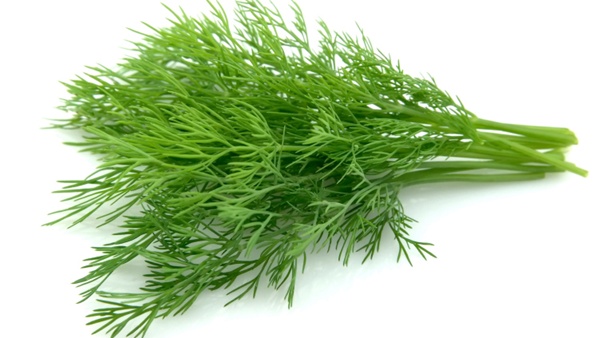
Dill is one of those healthy foods that often gets forgotten about. But you’ll want to make dill a regular part of your meals. This herb contains an impressive array of nutrients that can help protect you against all sorts of illnesses and health complaints.
Why does dill top my list of healthy foods? For starters, dill is an excellent source of vitamin A. Vitamin A is an essential vitamin that you need for good vision. In fact, a long term deficiency of this vitamin can cause blindness. Vitamin A also boosts immune function and protects skin health. Vitamin A is a fat soluble vitamin meaning that you need to take it with a little fat in order to absorb it. How much vitamin A does dill have? About 100 grams of dill will provide approximately 250% of the recommended daily intake of vitamin A.
Dill is also high in vitamin C. Vitamin C is a water-soluble vitamin. Vitamin C is used by your body to repair tissues and promote the growth of new tissues. Proteins formed from vitamin C are used to make blood vessels, tendons, ligaments, and skin. Vitamin C also functions as an antioxidant, helping to fight off infection and heal wounds. About 100 grams of dill contains approximately 140% of your recommended daily intake of vitamin C.
Why else does dill make the healthy foods list? It contains essential oils which help to fight diseases like cancer. One essential oil called monoterpenes has been found to stop the onset of breast, pancreatic and lung cancers. In fact, dill, like parsley, is often called a chemo-protective food.
Other essential oils in dill include d-carvone, dillapiole, DHC, eugenol, limonene, terpinene, and myristicin. Eugenol has been isolated and used as a local anesthetic. Eugenol has also been studied for its anti-diabetic effects. Preliminary research has shown that dill helps to reduce high blood sugar levels.
Dill is also high in calcium, which is an important mineral for preventing excessive bone loss in older adults. Dill can help you meet your daily requirements for calcium, helping to boost bone mineral density.
Another reason why dill is a healthy food is because it possesses anti-inflammatory properties. The herb could play a role in helping to relieve symptoms associated with arthritis and gout.
What other health benefits can dill impart? The herb could help improve your digestive health. It’s thought that dill stimulates the secretion of digestive juices. Dill also helps boost the production of bile which is needed to properly break down fats. Dill may be useful for those who feel constipated as the herb seems to promote normal bowel function. Anyone suffering from gas and bloating may find that dill eases these two health complaints.
One final benefit you can expect from dill is a better night’s sleep. The essential oils in dill seem to have a calming effect on the body. Dill triggers certain hormones involved in preparing the body to sleep. Dill also contains B-complex vitamins that aid in a more restful night’s sleep.
Sources:
“Dill Thrill: Top 6 Benefits of Dill,” NaturalNews.com web site, Dec. 30, 2013; http://blogs.naturalnews.com/dill-thrill-top-6-benefits-of-dill/, last accessed Jan. 7, 2014.
Zheng, G.Q., et al., “Anethofuran, carvone, and limonene: potential cancer chemopreventive agents from dill weed oil and caraway oil,” Planta Med. August 1992; 58(4): 338-441.













